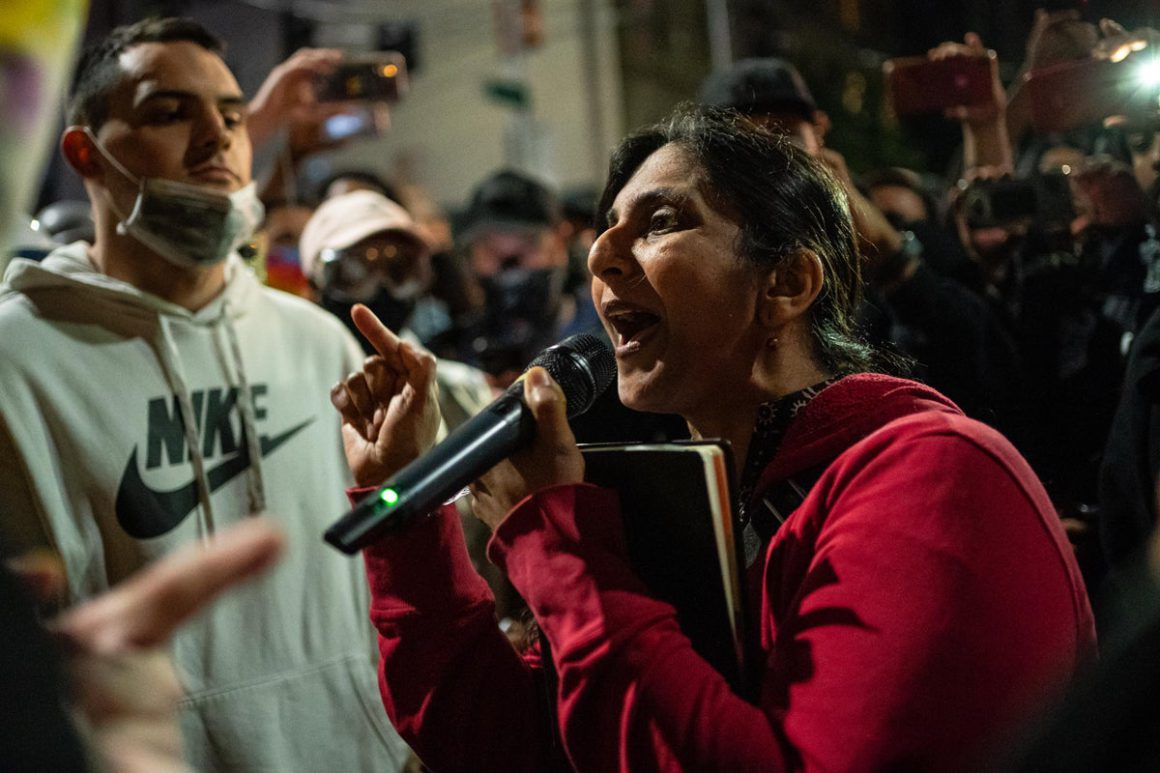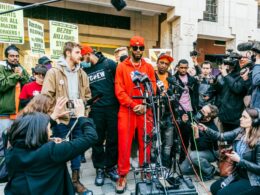By Greyson Van Arsdale, Socialist Alternative (our sister organisation in the United States)
This winter, Seattle will hold its first-ever December election in recorded history. The ballot question will be on the recall of Seattle’s only socialist councilmember, Kshama Sawant, as the culmination of a year-long effort by big business and the right wing to unseat her. The timing is an act of blatant voter suppression, with the vote held in between the two major U.S. holidays when many working people could easily not know an election is taking place.
Specifically, she’s being targeted for participating in peaceful Black Lives Matter protests, and for using her office to build a successful movement to tax Amazon and other big corporations to fund affordable housing and Green New Deal programs.
For the socialist and Black Lives Matter movements, this is a crucial moment. Three years before Bernie Sanders’ historic presidential campaign in 2016, Kshama Sawant blazed a trail as Seattle’s first elected socialist in a hundred years. Her office has spearheaded victories that have led the way for socialists and progressives nationally, including the first $15 minimum wage in a major U.S. city, the Amazon Tax, and landmark renters’ rights victories that have Seattle’s real estate lobby in an uproar.
Amazon and big business failed to buy Kshama’s city council seat in 2019, despite record corporate spending. So now, once again, socialists are going head-to-head with wealthy corporations in Seattle to defeat this recall and defend our movements’ victories. In this historic election, which is likely the highest-stakes local election in 2021, it will take an all-out effort to win.
Republican-Led voter suppression in “Liberal Seattle”
Though Seattle boasts a progressive reputation, the Recall Campaign against Kshama has brought the city’s Republicans out of the woodwork in unparalleled fashion. Their campaign has taken donations from more than 500 wealthy Republicans, including 130 Trump donors, and among them the top Trump donor in Washington state, corporate landlord George Petrie. The recall has also attracted the support of more familiar enemies, such as Amazon executives — who bankrolled Kshama’s opponent in 2019, only to lose to historic voter turnout from working people in Kshama’s favor. So far, three top Amazon executives (John Schoettler, Morgan Battrell, and Doug Herrington) have donated to the recall.
The recall campaign’s right-wing, undemocratic character is on full display in their use of voter suppression to try to oust Kshama from office. Aiming to undermine the historic voter turnouts of working people, renters, communities of color, and youth that have won Kshama three consecutive elections, the recall sat on their ballot petition signatures and refused to file them with the county until it was too late for the issue to appear on the normal General Election ballot. The timing of their petitions gave the county no choice but to set an unprecedented and undemocratic holiday election date in between Thanksgiving and Christmas, on December 7.
Seattle’s working people have long been overburdened with skyrocketing rents and living costs, causing them to work long hours and often several jobs. In the course of a busy day-to-day life, most are not plugged in to the goings-on of every single election, and will be even less so between Thanksgiving and Christmas, just a few weeks after the November election. The Recall Campaign chose this terrain intentionally, aiming for an election decided by the wealthiest, whitest, most conservative sections of Kshama’s district against the majority who re-elected her for the third time less than a year before the recall was filed.
The recall’s attempted voter suppression is blatant. Between a typical November general election and a regular special election (which take place in February), voter turnout can drop by up to 50 percent — and the electorate of special elections tends to be overwhelmingly wealthier and whiter. In not only a special election, but an unprecedented holiday election, that dropoff has the potential to be even higher.
In this context, our campaign will go all-out to drive up voter turnout. The Kshama Solidarity Campaign has announced a historic “Get-Out-The-Vote” effort to reach as many working people as possible. To win, our movement will need to knock on hundreds of thousands of doors, and even surpass the historic ground game that won Kshama re-election in 2019.
What are the charges?
When the recall charges were first filed in August of 2020, it was obvious that they were a retaliation against Kshama for standing with the Justice for George Floyd movement. Though only three charges remain after the court process, one of the original six charges filed by the Recall Campaign called the Black Lives Matter protests a “war zone” and argued that Kshama “failed…to ensure our safety and our ability to live in peace.” Despite the fact that the most overtly racist charges were thrown out, the remainder carry out the same dishonest job of vilifying the Black Lives Matter movement and attempting to criminalize movement-building.
The first charge
The Charge: “Kshama led a march to Seattle Mayor Jenny Durkan’s house, the address of which is protected.”
The Facts: As Durkan’s police department was rampantly tear-gassing Seattle neighborhoods and protesters, the families of victims of police violence organized a peaceful protest and asked Kshama to speak at it. Kshama spoke in solidarity with the families, but didn’t know Durkan’s address and had nothing to do with the march’s route.
The second charge
The Charge: “Kshama threatened public safety by opening City Hall to BLM protesters for a rally.”
The Facts: Kshama opened City Hall to protesters for a masked, socially-distant public meeting that lasted less than an hour. Not only was the demonstration peaceful and extremely careful to be COVID-safe, it provided a crucial space for the movement to discuss next steps forward — which directly led to winning Seattle’s first-in-the-nation ban on police use of chemical weapons against protesters.
The third charge
The Charge: “Kshama misused public funds to support a ballot initiative, Tax Amazon.”
The Facts: Kshama spearheaded the movement to Tax Amazon, which succeeded in winning millions of dollars in funding for affordable housing and Green New Deal programs in 2020. In January 2020, Kshama’s office bought materials and food for a Tax Amazon organizing meeting of community members. Tax Amazon was not a ballot initiative, and the movement did not vote to attempt taking the issue to ballot until months later. Regardless, when the Seattle Ethics and Elections Commission (SEEC) ruled that Kshama should pay a small fine for this, Kshama did so. Big business is not angry about the SEEC fine, they are angry Kshama led the historic victory on the Amazon Tax.
Protesting, whether it’s outside the mayor’s house or inside City Hall, is not against the law. Neither is using your office to organize and build community meetings of working people to tax big business. But the forces behind the recall clearly wish they were, and they want to remove one of the only elected representatives in the country prepared to put herself on the line for working people and the oppressed.
What the recall represents
What is the recall really about? The recall’s donor list gets to the heart of the matter — it’s a Who’s Who of major area real estate executives, hedge fund managers, investors, landlords, union-busting business owners, and the wealthy. In fact, the top three billionaire dynasties in Washington State have donated money to the recall. Ultimately, this recall represents the fury of the rich and powerful that Kshama has spent eight long years building movements of working-class people to win major victories.
Even beyond winning Seattle’s $15 minimum wage and the Amazon Tax, Kshama’s office has a prolific record of passing renters’ rights legislation, has walked countless picket lines in solidarity with striking workers, has successfully organized tenants and community members against displacement, and has won tens of millions of dollars in funding for social services by organizing the “People’s Budget” every year since she was elected.
So desperate were they to be rid of Kshama that big business cumulatively spent $4 million trying to defeat her and other progressives in the 2019 Seattle elections, including $1.4 million from Amazon alone. The bulk of that money went towards propping up Kshama’s corporate opponent — but working people fought back and organized historic voter turnout, re-electing Kshama to a third term. This stunning defeat of Amazon and big business spurred the momentum to win the Amazon Tax less than a year later.
As history has shown countless times, when big business loses a crucial battle even with the rules weighted in their favor, they try to overturn it by hook or by crook. Instead of allowing Kshama to serve the four years as Seattle’s working people elected her to do, they conjured up a recall to overturn the election they couldn’t buy, by manufacturing the least democratic vote they could muster.
This recall clearly mirrors the story of Seattle’s last independent elected socialist, Anna Louise Strong, an activist and journalist who won a seat on the School Board in 1916. As the ruling class whipped up nationalist sentiment with the U.S.’s entry into World War I, Strong faced off against a right-wing recall that took issue with her anti-war, pro-labor stance — and she lost. The wave of anti-socialist attacks that ousted Strong would return again in the 1950s, then named “McCarthyism” — and as socialists are elected to office in the modern day in increasing numbers, we can expect a resurgence of red-baiting and McCarthyist methods.
However, the recall is sending an important message by tying their attack on Kshama to the Black Lives Matter movement. The Justice for George Floyd uprising was the largest protest movement in United States history, and was a powerful demonstration of mass anger at racist police brutality. For the first time in recent history, major cities enacted cuts on their police department budgets rather than lavishing them with more funding for military-grade weapons (though many of these cuts have since been reversed).
Protesting with the Black Lives Matter movement is not against the law — but if they successfully recall Kshama for doing so, they could further clamp down on protest movements and set a precedent against other socialist elected officials participating in them, and drive the right-wing narrative that Black Lives Matter protests are “riots.”
The system upholding the recall
The recall’s rhetoric has painstakingly repeated that “no one is above the law,” though they have so far failed to name a single law that Kshama has broken. At the same time as they espouse adherence to this “rule of law” — the idea that laws should be applied evenly and to everyone — the recall itself has purposefully undermined the most basic democratic right of Seattle voters by flagrantly suppressing the vote.
This kind of hypocrisy is to be expected from the right wing. But at every turn, the supposedly impartial institutions of capitalist democracy have upheld and advanced this hypocrisy. In fact, the only reason the Recall Campaign was in a position to secure this unprecedented December election was because the Washington State Supreme Court delayed their ruling on the recall until three full months after their originally planned decision date, and upheld charges against Kshama that were not only false but easily disprovable.
Only months earlier, that same court threw out a recall effort against Seattle Mayor Jenny Durkan, which aimed to remove her from office for signing off on widespread use of tear gas by police on peaceful protesters during the Justice for George Floyd uprising. Durkan’s oversight of use of chemical weapons on protesters during a respiratory pandemic was so publicly callous that it earned her the nickname “Teargas Jenny” — and yet the state Supreme Court summarily dismissed the charges. The courts also outrageously threw out the recall charges against Thurston County Sheriff, John Snaza, who refused to uphold the COVID mask mandate with his officers.
These severe injustices join a long history of the court system under capitalism working against ordinary people. The courts have failed on a massive scale to produce justice for victims of police brutality, and routinely do not indict violent police officers who are caught on video. Just two months ago, the Supreme Court itself turned a blind eye to a law in Texas that bans abortion after the first six weeks of pregnancy, before most people even know they are pregnant, refusing to uphold the precedent of Roe v. Wade.
This is why, historically, movements for justice have often found it necessary to break unjust laws and fight against the courts in order to win real change. During the Civil Rights era, defying segregation was illegal. The refusal of Rosa Parks to sit in the back of the bus was an illegal act that helped spark the historic Montgomery Bus Boycott which paved the way to win desegregation. Especially in the context of the recall clearly attacking and vilifying the Black Lives Matter movement, it bears repeating that the greatest gains have come from being relentless, and breaking unjust laws when needed. While Kshama did not break the law, she has always been willing to put herself on the line to stand up for working people, as all socialists should be.
But the recall demonstrates how the courts under capitalism will fight tooth and nail — and abandon all semblance of neutrality in the process — to defeat socialists fighters who threaten their system.
All eyes on Seattle
If the recall is successful, it will set a dangerous precedent for the future: that when big business is unable to unseat socialist elected officials through regular methods (like flooding their elections with corporate cash), they’ll resort to extraordinary methods. In this sense, the recall against Kshama Sawant is a test case — if she’s ousted from the City Council on racist and flimsy charges by depressing voter turnout of working people, it will lay the basis for future attacks on other elected socialists, the potential rollback of our victories in Seattle, and broader attacks on Black Lives Matter and the left nationally.
While this unprecedented election poses serious challenges (and may in fact be the harshest terrain that our movement in Seattle has faced yet), our record shows that we can in no way be underestimated. If we can beat this recall and defend Kshama Sawant, a trailblazing socialist and genuine movement leader, not only can we once again demonstrate that Amazon and the real estate giants are not too big to beat, we can build serious momentum to win rent control for the first time in Seattle.
The stakes are high, and we are not just playing defense — we have a world to win.












